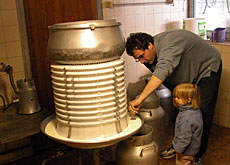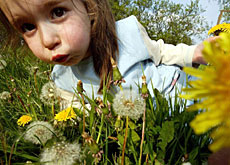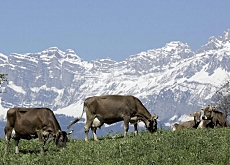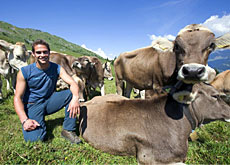Cows’ milk can protect against asthma

Children who start drinking fresh milk from the farm early on are less likely to develop allergies when they are of school age, according to Swiss scientists.
But why more people are suffering allergies remains unclear, say researchers at Basel University, who have begun a study involving more than 14,000 children.
Cows’ milk as food for infants has a bad reputation. From a nutritional perspective it does not fulfil the dietary requirements of babies, and children who are fed only cows’ milk for too long often suffer an iron deficiency.
But there is now positive news concerning cows’ milk. Marco Waser and fellow epidemiologists at the Institute of Social and Preventive Medicine of Basel University have shown that children, even from the age of one, who consume fresh milk straight from the farm – whether untreated or boiled – are less likely to develop asthma and hay fever.
Roughly 30 per cent fewer children had asthma and about 40 per cent fewer children developed hay fever.
“[The study] showed that the protective effect was greatest for children who until now had regularly drunk milk that came from a farmyard,” Waser said.
The data was taken from the “Parsifal” study, which involved 14,000 children.
“What is astonishing is that the milk’s protective effect was no longer dependent on whether the children actually lived on a farm. This obviously opens new perspectives for more widely applied preventive measures,” he added.
Hypothesis
Asthma is today one of the most common illnesses, in particular in industrialised countries, and its frequency is increasing. The number of new hay fever cases also continues to rise.
Why this should be remains a mystery: air pollution, lifestyle and different nutritional habits have all been suggested.
There are also many supporters of the “hygiene hypothesis”, which contests that our modern environment is too sterile, with the result that the stimulation of the immune system in early ages is absent.
“The hygiene hypothesis has solid foundations,” said Roger Lauener, a paediatrician and allergy expert at Zurich Children’s Hospital.
The hypothesis is also believed to be behind the secrets of the healthier farm children. Thus Lauener was able to demonstrate how harmless microbes in the immune systems of farm children triggered certain changes.
But what exactly lies behind the proven protective effects remains unclear. It is also possible the microbes play a role here as well, yet the researchers say it is astonishing that it made no difference whether the milk was boiled or not.
What’s more, other products that are eaten straight from the farm, such as fruit or vegetables, had no protective effect whatsoever.
Therefore scientists are looking at other components of milk, for example omega-3 fatty acids.
Early effect
The Swiss researchers are hoping to get more solid insights from the “Pasture” study, in which the allergy development of 500 children who have grown up on farms and 500 who haven’t has been specifically monitored over four years.
The Pasture study includes the effects of mothers’ milk and cows’ milk among other factors.
The advice of Swiss paediatricians remains that children should not be given cows’ milk before their second year. By that time it cannot do much harm – but it has probably also lost a lot of its preventive power.
“These effects on the immune system are a factor above all in one’s earliest childhood,” said Lauener.
swissinfo, based on a German article by Matthias Meili
An allergy is a local or systemic inflammatory response to allergens, things that cause an allergic reaction.
Allergies often follow the same pattern and children with a tendency to allergies often suffer from related illnesses.
One in five Swiss is estimated to suffer from allergies and more than 400,000 people have asthma. Some experts believe that these figures are likely to rise.
Grass pollen is the most common allergen, followed by dust mites, birch pollen and cat hair.

In compliance with the JTI standards
More: SWI swissinfo.ch certified by the Journalism Trust Initiative



You can find an overview of ongoing debates with our journalists here. Please join us!
If you want to start a conversation about a topic raised in this article or want to report factual errors, email us at english@swissinfo.ch.